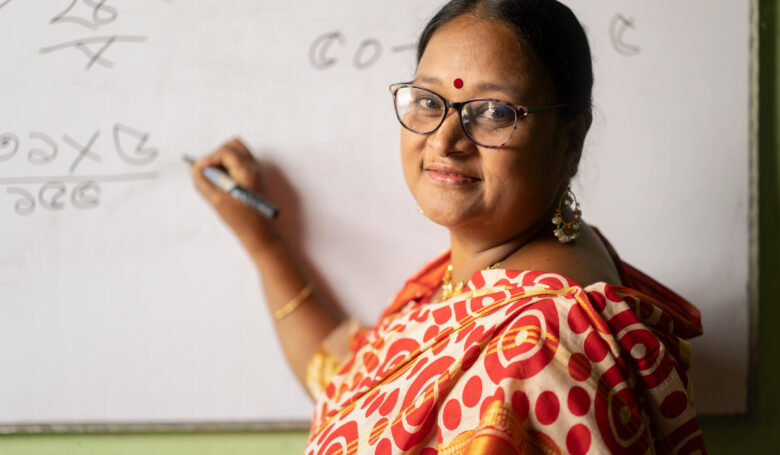A teacher that has failed or succeeded?

During her ten-year career as a teacher, Maya Pandey from Bangladesh has heard and seen many things. She enjoys teaching and meeting children and young people – their challenges do not go unnoticed. In her home region of the country, child marriages take place, although it is prohibited by law. Sometimes, when they hear about plans for marriage, the school and the authorities try to prevent it.
“The community wants change, but the pressure is high, even on leaders,” Maya Pandey says sadly.
A girl that Mayan Pandey knew was married when she was in fifth grade. Just a month after the wedding, her husband abandoned her, and she returned to her parents.
“He wasn’t good-natured and because the wedding was organized very quickly, the family didn’t have time to check his background,” Maya Pandey explains.
A wedding arranged for fear of being caught is not a girl’s dream. Just being married to a stranger is already a traumatic experience, but if a man mistreats a girl, the situation is even worse. Unfortunately, a fifth-grade girl knows firsthand how terrible this experience is.
“Her husband was interested in other women, and she didn’t get the love she expected as a wife,” Maya Panday says.
In this community, people think that if you’re not married at 13, you’ll never get married.
She had stated that she wanted love, but she didn’t get it even for a day. Now she lives in her home village and is learning handicrafts so she can earn a living for herself.
Failed as a teacher?
Six years ago, she and others tried to prevent a 13-year-old girl from getting married. However, the girl was taken to the temple at night and there was nothing else that could be done after that.
Poverty and fear of reputational damage are high. If a girl is sexually assaulted or even talks to boys, it ruins the reputation of the whole family. Therefore, the aim is to marry the girls as soon as possible.
“This community thinks that if you’re not married at 13, you’ll never get married,” Maya Pandey explains.
Maya Pandey has reminded parents that they can ask her for help.
“I told the parents that together we could come up with a solution. In this way, the girl does not need to be married, but can have a better life.
Providing for girls and paying for their education costs money. After a girl gets married, her parents don’t have to worry about her anymore. It can be a relief for many poor families.
“Every time it feels like a failure when a girl is married too early,” Maya Pandey says sadly.
Over 100 changed lives
An unmarried young woman is a burden to her family. Maya Pandey decided to solve the problems of unmarried girls. She taught girls between the ages of 18 and 19 how to sew so that they can earn money.
More than 100 girls have learned to sew and can earn a living.
“It all started when young girls saw me sewing and asked me to teach them,” Pandey smiles.
This will allow girls to be more independent now and in the future.
“More than 100 girls have learned to sew and can earn a living,” smiles Maya Pandey.
Some of the girls work as seamstresses, while others have since started families. The girls have acquired more meaning and a new direction to their lives. Preventing child marriage, investing in girls’ education, and giving up the idea that children over the age of 13 cannot get married are big things. According to Maya Pandey, child marriage can be prevented if the family, community and leaders change their mindset.
“The problem is the customs and traditions, and they don’t change in a day, but education is important,” Pandey says firmly.
Even one child marriage is one too many. You can help prevent child marriage in Bangladesh and enable girls to get an education. By donating to the Eväät elämään campaign, you support Fida’s long-term work in Bangladesh.
Donate
- MobilePay to the number 76551
- Donate €20 by texting FIDA20 to 16155
- By bank transfer: Fida International ry. IBAN account number: FI41 228 718 0000 5256, Reference number: 558002
